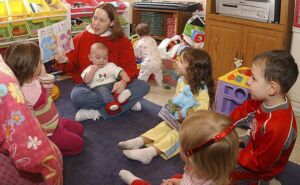News
Early closing at daycares causing parents to trim working days
This article is more than 10 years old.
Business group criticises short chidcare hours

Short daycare hours are causing problems for parents (photo: Starz)
The closure of daycare institutions at 17:00 are often forcing parents to change their working hours or, in extreme cases, even leave or switch their jobs.
Business group Dansk Erhverv said that parents are being stressed out by the fact that only 54 out of the 98 municipalities keep their daycare centres, both nurseries (vuggestuer) and kindergartens (børnehaver), open past 17:00.
“We find that the opening times are both shorter and less flexible these days,” Stine Pilegaard Jespersen from Dansk Erhverv told DR Nyheder.
“It is challenging in a flexible labour market where both the employee and employer expect to work at different times of the day.”
No evening daycare
A DR Nyheder poll showed that only 309 out of 3,281 municipal and independent daycares are open after 17:00, and most of those that do stay open are only open until 17:15 or 17:30. Only 11 daycares in the entire country are open after 18:00.
At many municipalities there is no childcare at all available after 17:00.
Respondents to a DR poll conducted by the HK union said that the closing times are having a serious impact on both parents and businesses.
Of the 300 respondents, one in five said that they had been forced to cut their working hours to meet daycare opening hours.
“This is a major problem,” said HK chairperson Kim Simonsen. “We have members that want to work, but it will require the politicians to change the institutions opening hours.”
Better in Sweden
Jespersen supported Simonsen’s position.
“If the daycare system does not support full-time workers, they have to reduce their hours to part-time, and that shortchanges the labour market.”
The HK survey revealed that 17 percent of those surveyed are considering completely leaving the workforce due to the daycare opening hours.
READ MORE: Parents sending sick children to daycare
In Sweden, daycare institutions across the country are open until 19:00 and most are open on the weekends.










































